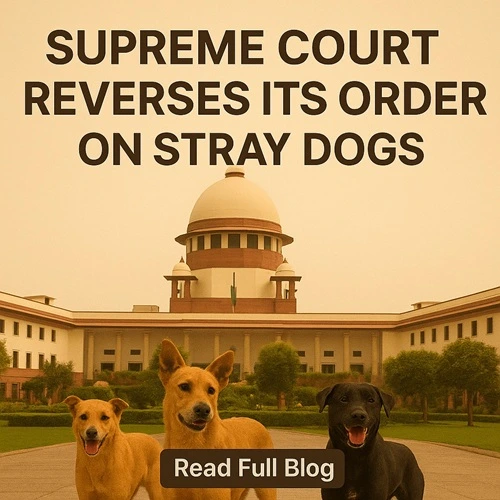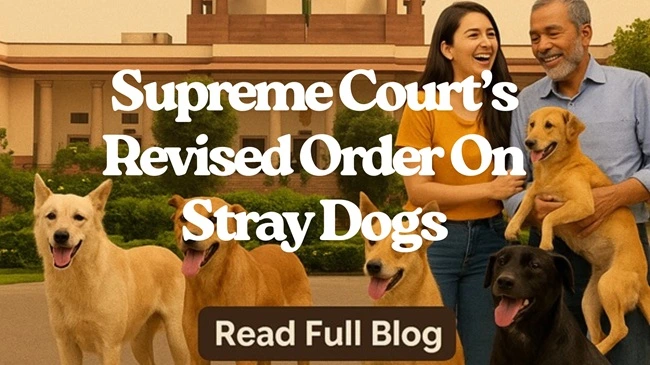India’s Supreme Court has modified its earlier August 11 directive on stray dogs in Delhi–NCR. After a week of public debate, legal petitions, and questions around capacity and humane management, the Court has clarified that stray dogs must be released back to the same localities after sterilisation and immunisation except dogs that are rabid or demonstrably aggressive. This is a major pivot from the initial “no-release” instruction and brings the approach closer to India’s Animal Birth Control (ABC) Rules, 2023.
Below is a clear, practical explainer of what the latest order says, what it means on the ground, what’s allowed or not, and what will happen to dogs already picked up.

What Exactly Did the Supreme Court Change?
The August 11 Order (Context)
On August 11, a two judge bench directed Delhi–NCR authorities to round up stray dogs, set up shelters, and not release captured dogs to the streets. It also required a 24×7 helpline and a four-hour response timeline to dog bite complaints. Obstructing the operation could invite contempt of court.
Key points from Aug 11:
- “Not a single dog picked up… shall be released back on the streets.”
- Create stray dogs bite helpline within one week; respond within four hours to complaints.
- Maintain CCTV-monitored shelters, adequate staffing, food, and veterinary care; consider adoption via the AWBI protocol; ensure no cruelty/overcrowding.
- Obstruction by any person/organisation can invite contempt.
The August 22 Clarification/Modification (Latest)
Today, the Court revised that stance. The latest direction is to release sterilised and immunised stray dogs back into their original localities, except those that are rabid or aggressive. This narrows the scope of permanent sheltering and aligns practice with ABC Rules, 2023, which India has relied on for humane, scientific dog population management.
Why the change? Practicality and humane management concerns, Lack of shelter capacity, feasibility issues, and alignment with established ABC protocols prompted a course correction.
So, What Happens Next on the Ground?
1) Sterilise, Immunise, Release (SIR) — With Safety Filters
- Municipal bodies (e.g., MCD and NCR authorities) will pick up community dogs, take them to ABC centres for sterilisation and anti-rabies vaccination, and if healthy and non-aggressive, release them back to the same locality.
- Stray Dogs found rabid or with sustained aggressive behaviour will not be not released; they must be quarantined/treated per veterinary protocol, with decisions guided by public safety considerations and the ABC Rules framework.
2) Helpline & 4-Hour Response Continue
- The August 11 directions on setting up a helpline and rounding up dogs involved in bite incidents within four hours remain a lodestar for enforcement agencies. Expect a single window number for dog bite reporting and rapid response.
3) Documentation, Monitoring & Shelter Standards
- Authorities must maintain daily records of dogs captured, treated, released, or retained.
- Shelters (for rabid/aggressive/isolated cases, treatment, or temporary holding) must have CCTV, staff, food, and regular veterinary care, with no overcrowding or cruelty.
4) Adoption (Optional, Case-by-Case)
- Adoptions can be considered but only as per AWBI’s Standard Protocol (17 May 2022) and without using adoption as a backdoor to re-release dogs in violation of Court safeguards.
What’s Allowed vs Not Allowed Now
Allowed
- ABC operations: Capture → Sterilise → Immunise → Release back to the same spot for non-aggressive, non-rabid dogs.
- Humane care in shelters: Adequate food, water, space, monitoring, and veterinary attention.
- Adoption through AWBI protocols (where appropriate).
- Reporting bite incidents on the helpline and expecting action within four hours.
Not Allowed
- Releasing rabid or aggressive dogs back into public spaces.
- Mishandling/cruelty to dogs in shelters (the Court has explicitly warned against overcrowding and inadequate care).
- Obstructing authorised ABC/municipal teams, this can invite contempt of court proceedings.
Penalties, Fines & Legal Exposure: What Does the Order Say?
- Contempt of Court for obstruction: The August 11 order explicitly warns that any “hindrance or obstruction” of the operation will be treated as contempt, inviting strict action by the Court. Contempt is a serious offence and can lead to penalties and/or imprisonment as determined by the Court.
- Specific monetary fines for feeding: The Supreme Court has not prescribed a new schedule of monetary fines for feeding strays in this proceeding. Local bodies may issue operational advisories (e.g., designated feeding points, timing, hygiene norms), but any new fine regime would have to come from applicable municipal/by-laws or future government notifications, not from this specific modification.
Bottom line: The most explicit “penalty” in play from the Court’s orders is contempt for obstruction. If you’re a resident or RWA, cooperate with authorised ABC teams, follow designated feeding/hygiene guidelines once issued locally, and use the helpline for bite incidents.
What Happens to Dogs That Were Already Picked Up?
- If already sterilised & vaccinated, and not rabid/aggressive: They should be released back to the same locality per today’s clarification. Expect municipal bodies to update logs and coordinate releases.
- If currently in shelters awaiting ABC: They will undergo sterilisation and vaccination; then, if healthy/non-aggressive, they should be released back.
- If found rabid or proven aggressive: They will be isolated, treated, or managed per veterinary protocols and not released. Humane standards apply; euthanasia is restricted under ABC Rules to incurably ill or mortally wounded cases.
How This Aligns with ABC Rules, 2023
The Animal Birth Control (ABC) Rules, 2023, India’s operative framework, emphasise sterilisation and immunisation, with dogs generally returned to their original territories after treatment. The Court’s latest stance re-centres that approach while carving out public safety exceptions for rabid/aggressive animals. The Union Government has repeatedly backed ABC as the humane, scientific way forward for population control and rabies reduction.
Execution Challenges to Watch
- Capacity & staffing: Delhi-NCR needs sufficient ABC centres, vets, and dog-catcher teams. Recent reports show a push to expand capacity, but staffing gaps (catchers and vets) are real. Tracking releases and exceptions (aggressive/rabid) will require tight documentation.
- Data & transparency: Daily logs, CCTV at shelters, and public helplines will be critical to maintain trust.
- Public communication: Clear do’s and don’ts for residents/RWAs—especially around designated feeding, sanitation, and how to report bites—will help avoid conflict and misinformation.
Practical Do’s & Don’ts for Residents and RWAs
Do
- Cooperate with authorised ABC teams during capture/return.
- Report dog-bite incidents to the official helpline (once announced/activated) and seek post-exposure prophylaxis immediately.
- Follow designated feeding norms (locations/timings/hygiene) once local bodies notify them; it reduces territorial aggression and public health risk. (This is consistent with ABC-style advisories.)
Don’t
- Obstruct capture/ABC operations—this can lead to contempt of court.
- Release or relocate dogs on your own return protocols are carried out by the authorities/NGOs under ABC.
- Spread misinformation about blanket fines on feeders, if a city level rule appears, it will come via official notification.
Frequently Asked Questions (FAQ)
1) Will all stray dogs now be kept in shelters permanently?
No. As of Aug 22, 2025, the Court says release the dog back after sterilisation and vaccination unless it is rabid or aggressive. Only such exception cases will remain under treatment/monitoring or other managed arrangements.
2) Is there a fine for feeding stray dogs?
The Supreme Court has not announced a new monetary fine for feeding in this case. Local bodies may frame feeding guidelines (zones, timings, hygiene) and penalties under their by-laws, but that’s separate from today’s order. Obstructing ABC teams, however, risks contempt of court.
3) What if a dog bites someone in my area?
Use the helpline (to be created/operationalised) and expect action within four hours to pick up and assess the dog, the victim should be directed to immediate medical care and anti-rabies prophylaxis.
4) Can we adopt community dogs now?
Yes, but only through AWBI’s adoption protocol and with municipal oversight. Adoption cannot be misused to re-release dogs contrary to Court directions.
5) What happens to dogs already in shelters from last week’s drive?
If they are healthy and non-aggressive post-sterilisation/vaccination, they should be released back to their original spots. Rabid/aggressive dogs are not released and remain under veterinary protocols.
Final Word
With today’s modification, India moves back to a humane, science-based path—sterilise, vaccinate, and return—while drawing a firm line against releasing rabid or aggressive dogs. Expect tighter record-keeping, faster response to bite complaints, and continued judicial oversight. For residents and RWAs, the best way forward is cooperation, hygienic designated feeding, and prompt reporting—so that public safety and animal welfare travel together.

Hi, I’m Prashant Jain — a curious soul, storyteller, and content creator at heart.I’ve always been drawn to the world of entertainment, travel, sports, health & lifestyle — not just as a writer, but as someone who genuinely lives these experiences. Whether I’m binge-watching the latest OTT series, exploring offbeat spiritual destinations in India, or diving deep into wellness routines and cricket match insights, I love sharing what I discover with like-minded readers.
PopNewsBlend is my way of blending personal journeys with meaningful stories — ones that inform, inspire, and keep you ahead of the curve. Everything I write comes from real observations, hands-on experiences, and a deep passion for understanding the world around us.
Discover more from Popnewsblend
Subscribe to get the latest posts sent to your email.








Heya! I’m at work surfing around your blog from my new iphone!
Just wanted to say I love reading through your blog
and look forward to all your posts! Carry on the excellent work!